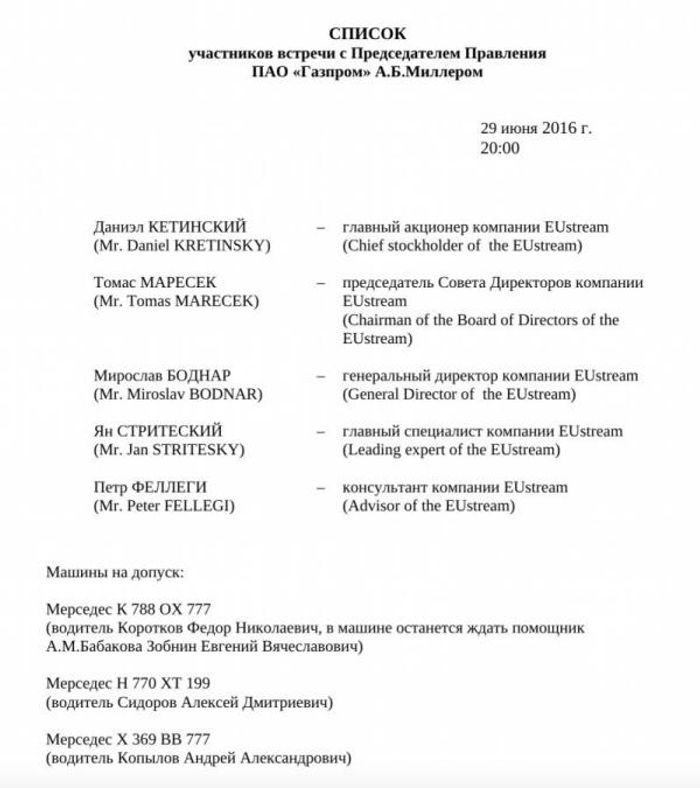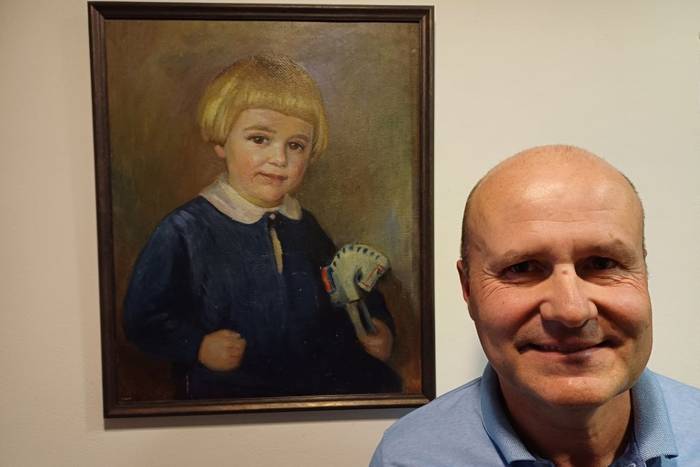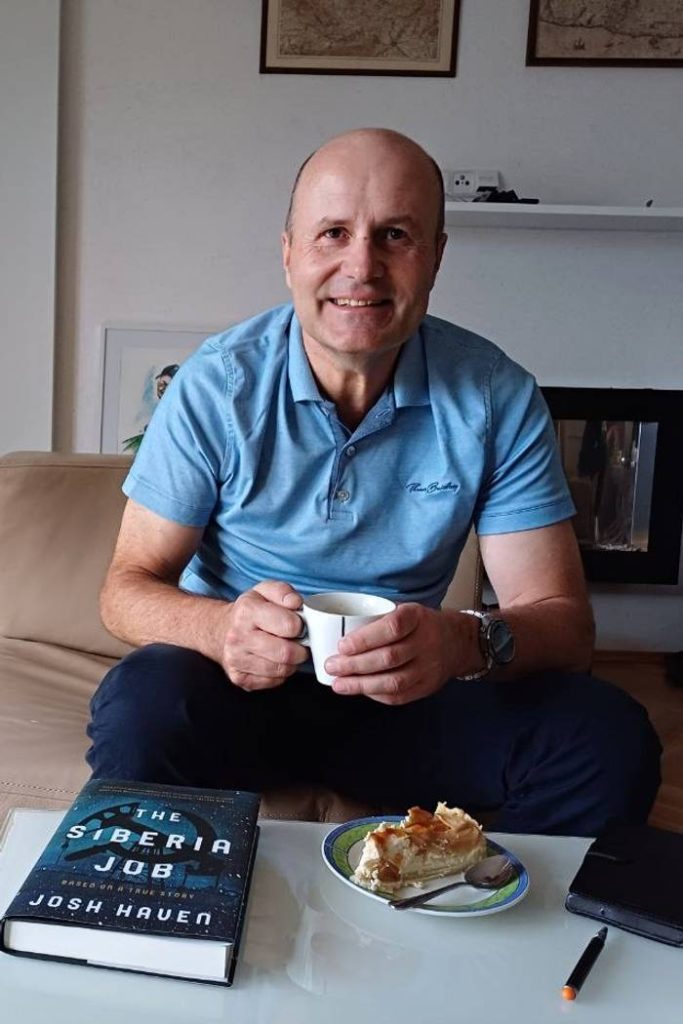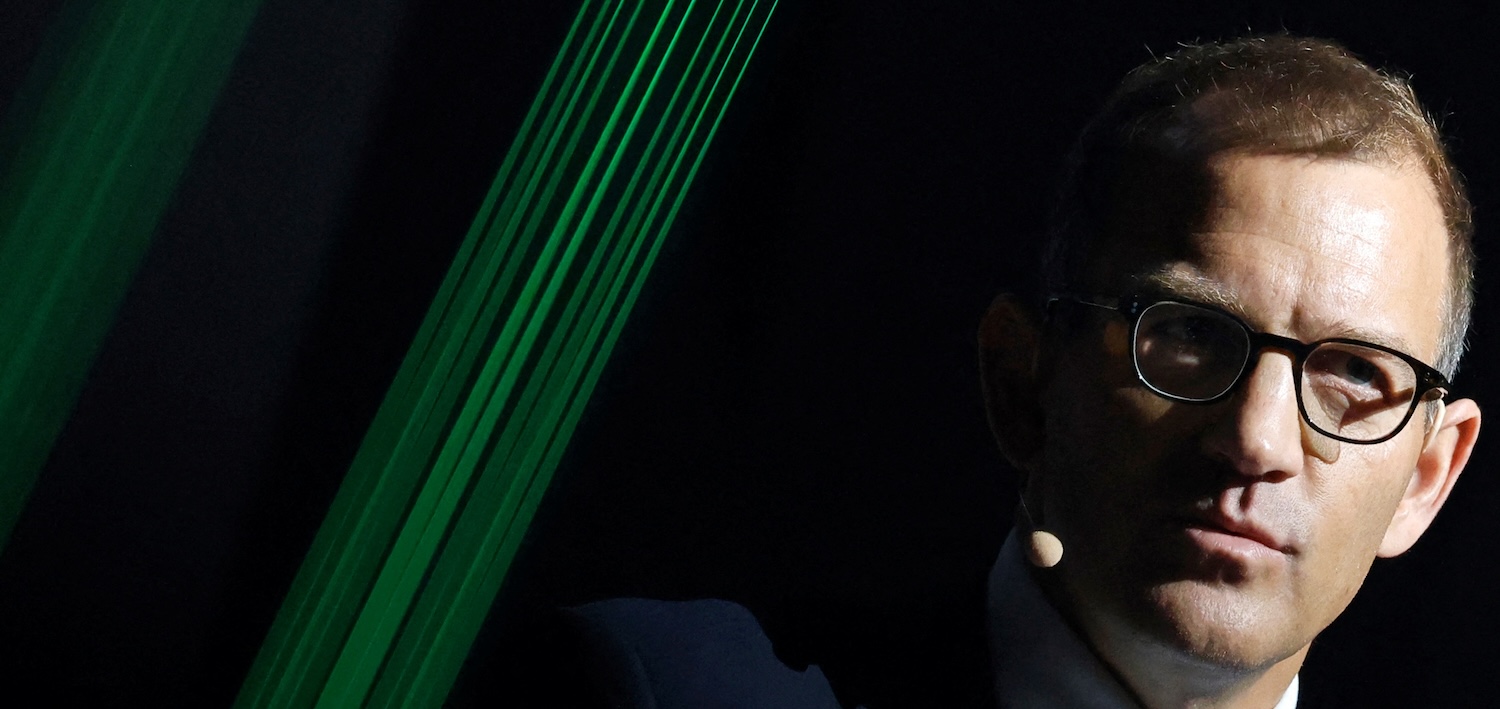(Deník Referendum) 2024-04-30
(Deník Referendum) 2024-04-30
In 2016, billionaire Daniel Křetínský, the owner of EPH, attended a meeting in Moscow with Gazprom executives. The meeting was arranged by the office of Aleksandr Babakov, a leading politician of the Putin regime. Babakov was already on the EU sanctions list at the time.
On June 29, 2016, after midday, a private plane, registration OK-SLN, took off from London and arrived in Moscow before 7pm local time, just in time for the 8 pm meeting at Gazprom’s headquarters.
Our analysis of the aircraft’s movements (see infobox below for more) suggests that the plane is regularly used for private and business purposes by Daniel Křetínský, owner of EPH Corporation, the largest single transporter of Russian gas to Europe. At that meeting in Moscow, according to leaked emails obtained by the Investigative Center of Ján Kuciak (ICJK), Daniel Křetínský was supposed to meet with Alexey Miller, the head of Russia’s Gazprom.
Daniel Křetínský is a Czech businessman. Over the last 15 years, he has become one of the richest and most influential people in the country. His rise is connected to his EPH corporation, which specializes in energy assets, and particularly in fossil fuel infrastructure, often buying facilities like coal mines and some of the most polluting coal power plants others see no point in keeping. But the thing that allowed him to amass his fortune, which he in turn used to purchase other assets all across Europe, was his share in the Slovak company Eustream. Eustream is in the business of transporting Russian gas.
Apart from energy businesses, Křetínský’s assets include retail, media (he is the second largest publisher in the Czech Republic and, until recently, used to have a share in France’s Le Monde) and sport (he owns Sparta Prague and West Ham United football clubs).
The leaked email communications suggest that the 2016 meeting was organized by the office of Aleksandr Babakov, a senior official of the Putin regime who has been on the EU sanctions list since the Russian invasion of Crimea in 2014. In addition to Křetínský’s executives, the list of participants also includes Peter Fellegi, a Czech businessman with longstanding ties to Russia who apparently played an important role in setting up the meeting.
The emails further show that Fellegi has been in contact with Babakov since at least 2008, and that their communication did not cease even after the Russian full-scale invasion of Ukraine in 2022. According to experts, even some of Fellegi’s joint activities with Babakov could be in violation of international sanctions.
A meeting in Moscow
Peter Fellegi, in a meeting with reporters from the news site Deník Referendum (DR), confirmed that the meeting between Eustream and Gazprom in Moscow in June 2016 took place, and that he was in attendance at the meeting as an advisor. “I was asked to provide services in relation to Gazprom for a certain short period of time, because I have long-standing ties there from the 1990s,” Fellegi, who has done business in Russia for Kellner’s PPF since the 1990s, told the DR reporters. However, according to him, he has not worked as an advisor to Eustream or for PPF for a long time.
Partial details of the planned meeting, including the list of participants, are known thanks to emails exchanged by Russian MP (and leading politician of the Putin regime) Aleksandr Babakov and his assistants. Babakov, who was previously a deputy speaker of the Russian State Duma, is in charge of relations with Russian communities abroad in the Russian parliament, and is often described as one of the key people managing Putin’s political interests in Europe.
Babakov’s specific role was and how he brokered the meeting with the Gazprom chief is not clear from the leaked emails. According to Fellegi, the meeting did not need to be “brokered” as theirs was a “normal working economic relationship.”
However, Křetínský’s plane from London took off only after Gazprom confirmed the meeting to Babakov’s secretariat. This timing suggests that the Russian politician’s office did indeed arrange the meeting.
Daniel Křetínský’s EPH holding company has managerial control of the Slovak Eustream, which transports Russian gas, although it owns only 49 percent of the company – the rest is held by the Slovak state. Gazprom is Eustream’s main business partner.
Fellegi himself sees nothing problematic in Babakov’s involvement in the whole affair. “Of course, in Russia, business relations between business and government structures are important. It’s nothing that should have raised extraordinary questions, it’s normal economic contacts that looked different then than from today’s point of view,” he told DR reporters.
However, Fellegi’s participation shows that, without Babakov, it is unlikely the meeting would have taken place. The Czech businessman is listed as an “advisor to Eustream,” but none of the publicly available information shows that he has ever had anything to do with Eustream or that he has ever acted publically as an advisor. Moreover, sources from inside Eustream told ICJK that the company had no contact with Fellegi at the time.
Fellegi had been in close contact with Babakov for years, as is evident from other emails – suggesting that his actual role was to use his Russian contacts to help make the meeting happen.

List of participants in a meeting at Gazprom’s Moscow headquarters, June 29, 2016. Printscreen OCCRP/Babakov Leaks
In addition to Fellegi, the list of the meeting’s participants includes the following names: Miroslav Bodnár, Tomáš Mareček, Jan Stříteský. These names are not surprising – they are representatives of Eustream. But Peter Fellegi’s participation raises even more questions about the role he and Babakov played.
Deník Referendum tried to get a comment on the Moscow meeting directly from Daniel Křetínský. However, he refused to talk to the DR reporters and the questions we sent him by text message were answered only in writing by Daniel Častvaj, the communications director and spokesman for EPH Corporation.
“Gazprom has been the largest natural gas transporter through Eustream for many decades. It is perfectly logical that there must be communication with Gazprom. It has always been conducted strictly in accordance with all applicable legislation. We categorically rule out any involvement of Eustream or EPH in negotiations on political issues or interests and have never been confronted with such a proposal,” Častvaj wrote.
Peter Fellegi did not want to talk about the content of the meeting, saying he “cannot comment on his work activities with clients.” But Fellegi told reporters that, at that time, “there was no great effort from Russia to develop exports to Central and Western Europe.” Aleksandr Babakov did not respond to questions sent by ICJK either.
Negotiations conducted amid fears of a drop in revenue due to the new pipeline
At the time, both of Eustream’s owners, Slovakia and EPH, were seriously concerned about the launch of the Nord Stream II pipeline, which would have allowed the direct transit of Russian gas to Germany via the bottom of the North Sea. If gas were to be transported directly to Germany in this way, Slovakia would lose its advantageous position as a transit country. And for Křetínský’s EPH, this would have meant big losses – so big that his entire business model could have been threatened.
The Slovak company Eustream, which transports Russian gas, was an essential element in the creation of the Křetínský empire, as previously reported by DR. For years, the transit of Russian gas has provided Křetínský with steady, huge profits.
The possible launch of the Nord Stream II pipeline was the subject of the official trip taken by the then-Slovak Prime Minister Robert Fico to Moscow in August of that same summer. Fico took Daniel Křetínský with him on that trip. And, according to Slovak media, the pipeline was also the subject of a secret meeting between Fico and Gazprom officials just days before Křetínský’s June trip to Moscow.
We did not get an answer to the question of how EPH and its owner, Daniel Křetínsý, are cooperating with the old-new government of Robert Fico on Eustream. Instead, Daniel Častvaj wrote: “We would like to remind you that after the entry of EPH, Eustream, in cooperation with the European Commission, commissioned the reverse flow gas transmission capacity to Ukraine, which played a key role for Ukraine’s energy independence. To date, Eustream has transported more than 60 billion cubic meters of natural gas to Ukraine from Western traders, significantly more than other routes.”
EPH often repeats this claim in its communications as evidence of its owner’s “pro-Western” profile. However, in one of its earlier pieces of investigative analysis, DR showed that the launch of the reverse flow was not the brave act in the interest of Ukraine that EPH’s spokesman now makes it out to be, but simply a pragmatic business decision.

Peter Fellegi in his house in front of a painting that is a family heirloom. Photo Jakub Patočka / Deník Referendum
Czech businessman’s activities with a Russian politician on the sanctions list
As already mentioned, the Kretinsky meeting in Moscow is not the only activity that links Peter Fellegi to Aleksandr Babakov. Among the emails we found a number of items that, taken together, paint a picture of a close relationship between Fellegi and Babakov, one dating back to at least 2008, when they appeared together at a business forum in Prague.
Fellegi received an invitation to Babakov’s 50th birthday party in 2013, and Babakov’s office was still arranging Russian visas for Fellegi in 2021. “Of course I knew Babakov, I don’t deny that, but we never had any joint business activities,” Fellegi said when asked about their relationship. However, several pieces of evidence, at least one of which is quite crucial, suggest otherwise.
Peter Fellegi’s contacts with the sanctioned Babakov did not cease even after the Russian invasion of Ukraine. In March 2022, Peter Fellegi forwarded an offer of Apple products from Bulgarian electronics dealer Alexander Kanazirski to Aleksandr Babakov’s assistant. Almost immediately after the war began, Apple had announced that it would stop selling its products on the Russian market.
The familial tone of the emails between the men suggests that Kanazirski knows Fellegi well. Other emails show that the two men, Kanazirski and Fellegi, even jointly organized Babakov’s visit to Bulgaria back in 2013.
In addition, Kanazirski states on his LinkedIn profile that he works for Proteus Management, a Bulgarian firm half-owned by the Liechtenstein-based Proteus Properties Establishment, which owns the Czech company Progredior, whose managing director is Peter Fellegi. According to the land registry, until 2020, Progredior owned the magnificent villa in Hodkovičky, Prague, which is now owned and lived in by Peter Fellegi. This is where DR reporters met him.
It also follows that Peter Fellegi and Alexander Kanazirski are, or at least were, business partners. Fellegi insisted: “I have not done business with any Apple products. I have never supplied anything to anyone, I don’t have any company that deals with such things.” He had no explanation as to how Kanazirski’s offer on Apple products reached Aleksandr Babakov.
According to international experts contacted for this piece, this could be a violation of European Union sanctions. However, only an investigation by the responsible institutions could provide the necessary proof. It is not possible to determine whether an order for Apple products was ultimately placed for Babakov
Peter Fellegi is a man about whom you will not find much public information. So far, only a handful of Czech journalists have spoken to him. Yet he has extraordinary insight into Russia and has willingly shared his knowledge with DR reporters.
His interest in Russia dates back to the previous regime, when – as the child of a Czechoslovak diplomat – he attended a Russian school in India. After 1989, he soon tried to put his knowledge of the Russian language and environment to business use. Since the 1990s, he has made purchases in Russia for Petr Kellner’s PPF. His business adventures in Russia are the subject of a book that will be published by Bourdon, written by his American business partner at the time.
Despite his strong ties to Russia, he now speaks of the regime there in highly critical terms. With amused disgust, he depicts the grandiose mentality of Russian oligarchs who –- despite a lavish lifestyle “with villas in Nice and Courchevel, Maybachs and exotic holidays in the Maldives” – yearn for the lost greatness of the Soviet era.
Fellegi is convinced that shortly after Russia’s invasion of Ukraine in 2022, there was a serious threat of a tactical nuclear attack from Russia “in the eastern part of NATO territory, including the Czech Republic.” He describes the source of the information as “people who made sense to listen to.”

Since the 1990s, he has made purchases in Russia for Petr Kellner’s PPF. His business adventures in Russia are the subject of a book to be published by Bourdon, written by his American business partner at the time, Josh Haven. Photo: Jakub Patočka / Deník Referendum
He also speaks captivatingly about the current internal situation in Russia: according to Fellegi, the war paradoxically strengthened the position of the Putin regime in some ways. Moscow has found a way around the sanctions, and, for the first time, the Russian elite is having to share the wealth from natural resources more widely – for example, with the families of conscripted soldiers, whose monthly income is an order of magnitude higher than is normal in the Russian provinces.
Fellegi is convinced that the war is likely to reach some kind of ceasefire, as neither side will have the strength to lead it to complete victory. “All wars, unless one side totally collapses, will end with a ceasefire of some kind,” he said.
Fellegi’s observations on Russia should probably be taken with a grain of salt, but he is undoubtedly an insider. However, all openness disappears when it comes to his business dealings with Daniel Křetínský and Aleksandr Babakov – and his involvement in the possible circumvention of the EU sanctions regime. Experts on EU sanctions against Russia contacted by ICJK and DK agree: the suspicions are serious and should be investigated by law enforcement authorities.
Cover illustration: Daniel Křetínský speaks at a conference in Prague, Czech Republic, October 17, 2023. Photo: DAVID W CERNY / Reuters / Forum
This article was originally published in Czech on denikreferendum.cz
Subscribe to “Goulash”, our newsletter with original scoops and the best investigative journalism from Central Europe, written by Szabolcs Panyi. Get it in your inbox every second Thursday!







